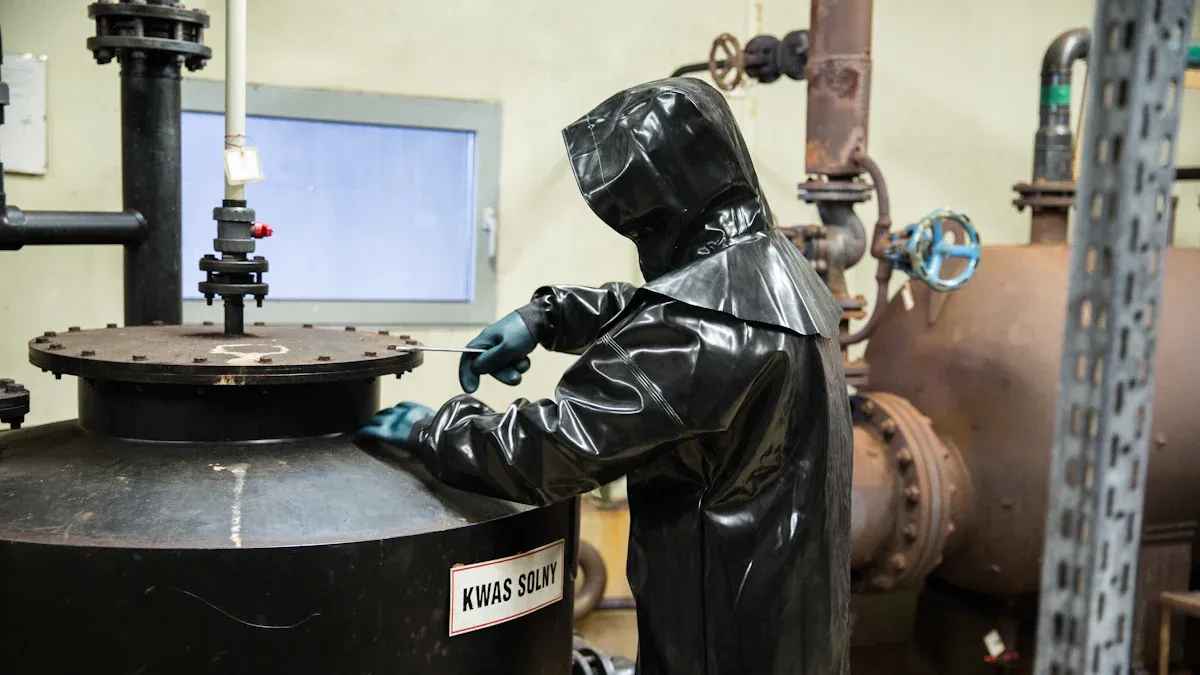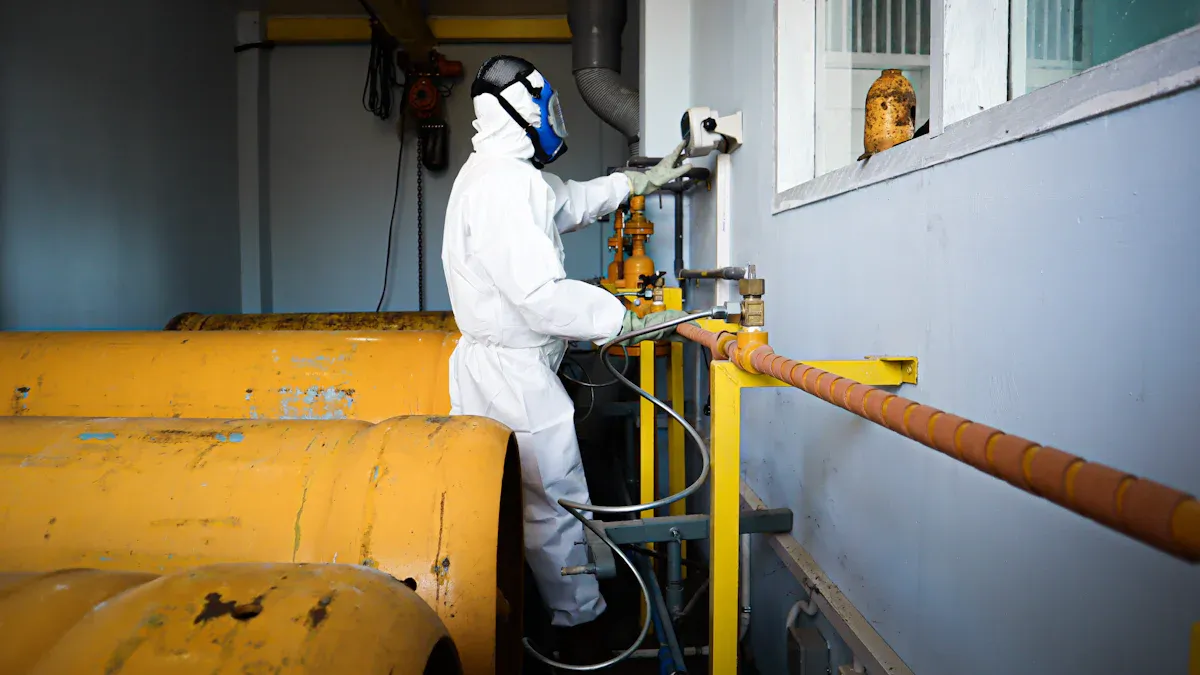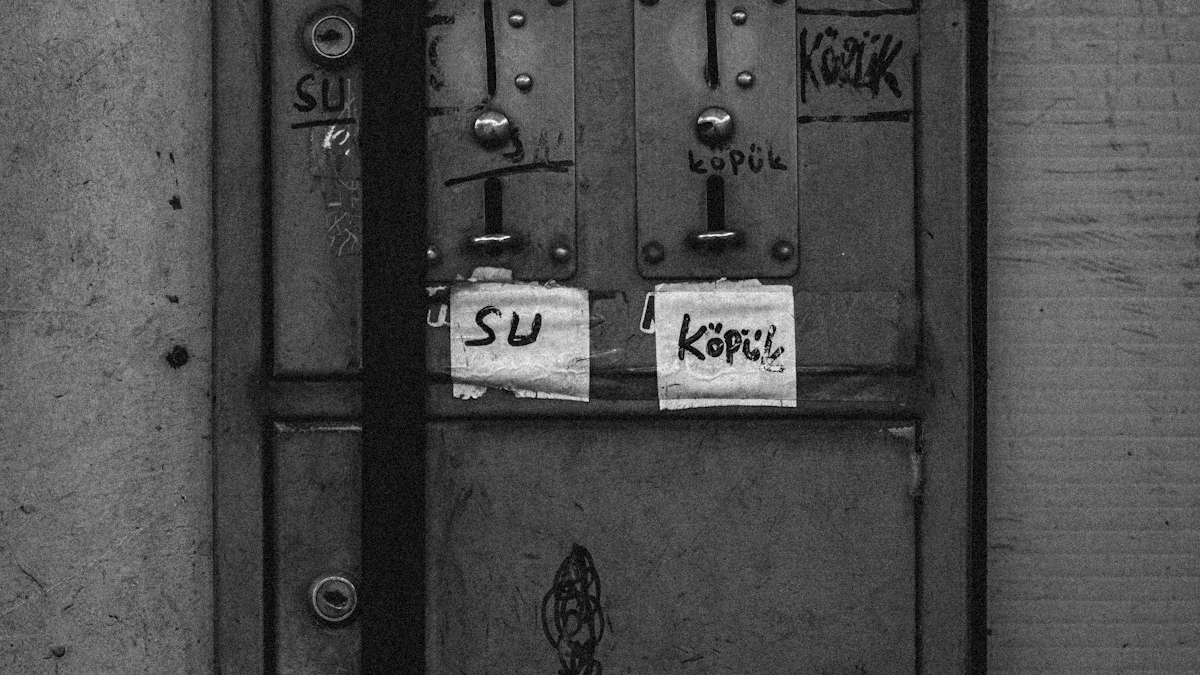
Modern worksites trust Teleindustria, Eaton, Zenitel, and GAI-Tronics for reliable communication in risky areas. Their IP Explosion Proof Telephone models, like the Eaton FHF ExResistTel, set the standard for safety. These brands design emergency Explosion Proof Telephone units with ATEX Explosion Proof Telephone certification and IP67 waterproof telephone protection.
Why IP Explosion Proof Telephones Matter

Worksite Safety and Compliance
Worksites face many risks every day. Workers need to talk to each other quickly, especially during emergencies. An IP Explosion Proof Telephone helps teams stay connected when it matters most. These phones meet strict safety rules, like ATEX and IECEx. Companies use them to follow laws and keep workers safe. When a site uses the right phone, it shows they care about safety and follow the rules.
Safety officers often check if worksites use certified phones. They want to see that every team can call for help fast. Using the right phone can help a company avoid fines and keep everyone safe.
Protection in Hazardous Environments
Hazardous areas can have gas, dust, or chemicals. Regular phones might spark and cause danger. Explosion proof phones stop this risk. They have strong cases and special seals. These phones keep working even in tough places like oil rigs or chemical plants.
- Workers trust these phones in storms, fires, or power cuts.
- The phones resist water, dust, and impacts.
- Teams can call for help, no matter what happens around them.
A worksite with an IP Explosion Proof Telephone gives everyone peace of mind. People know they can reach help, even in the worst conditions.
Key Comparison Criteria for IP Explosion Proof Telephone
Certification Standards (ATEX, IECEx, UL)
Every worksite needs phones that meet strict safety rules. ATEX, IECEx, and UL are the main certifications. These show the phone can work safely in places with gas, dust, or chemicals. When a phone has these marks, safety officers know it is ready for tough jobs.
Durability and Build Quality
Strong build quality keeps phones working in harsh places. Most models use tough materials and seals to block water, dust, and impacts. Workers can drop these phones or use them in storms, and they still work.
Connectivity Options (VoIP, Analog, 4G)
Phones connect in different ways. Some use VoIP, others use analog lines, and some support 4G. The table below shows how these options compare:
| Connectivity Type | Sound Level (dB) | Protection Class (IP Rating) | Communication System | Power Supply | Extra Features | Certification | Temp Range |
|---|---|---|---|---|---|---|---|
| VoIP | 60 – 110 | IP67 | SIP, PoE | PoE/external | SIP, beacon | ATEX, IECEx | -40°C to +60°C |
| Analog | 85 – 110 | IP66 | Analog | Line/ext | Some 3G | ATEX, IECEx | N/A |
| 4G | ~85 | IP66 | 4G, VoIP | External | Weatherproof | N/A | N/A |
Audio Quality and Noise Cancellation
Clear sound matters, even in noisy places. Phones use special microphones and speakers. They also use noise cancellation to block background sounds. Tests measure things like frequency range, sensitivity, and distortion. Many phones cover 20Hz to 20kHz and use smart filters to keep voices clear.
Smart Features and Integration
Modern phones do more than just call. They can send high-quality images and stream video. Some models use AI to tell voices apart from noise. Others connect with safety systems or third-party apps. These features help teams work faster and safer.
Tip: Smart integration can save time and help workers make better decisions in emergencies.
Ease of Installation and Maintenance
Easy setup saves time. Many phones use plug-and-play designs. Workers can mount them on walls or poles. Maintenance is simple, with easy access to parts and clear guides.
Price and Value
Price matters, but value is more than cost. The best phones last for years and need little repair. They also offer features that match the worksite’s needs.
After-Sales Support
Good support makes a big difference. Top brands offer fast help, spare parts, and clear instructions. This keeps downtime low and workers safe.
Top IP Explosion Proof Telephone Brands Overview
Teleindustria: Profile and Strengths
Teleindustria stands out for its focus on user-friendly design and flexible solutions. The company builds phones that work in many tough places, from factories to oil rigs. Their models often feature simple controls and clear displays. Many worksites choose Teleindustria because the phones are easy to install and maintain. Teams like the strong cases and weatherproof seals. Teleindustria also offers fast customer support, which helps keep downtime low.
Eaton: Profile and Strengths
Eaton has a long history in industrial safety. The brand’s IP Explosion Proof Telephone models, like the FHF ExResistTel, are known for their rugged build. Eaton uses high-quality materials that resist water, dust, and impacts. Many worksites trust Eaton because the phones keep working in extreme heat or cold. The company also provides a wide range of certifications, making it easier for safety officers to approve their products.
Zenitel: Profile and Strengths
Zenitel leads in intelligent communication systems for critical environments. Their phones use advanced technology to keep lines open during emergencies. Zenitel designs systems that protect people, property, and important operations. The phones run on a secure platform with real-time updates, which helps block cyber threats. Zenitel’s equipment is certified for both safe and hazardous zones, including EX approved loudspeakers for dangerous areas. Many industries, like energy and transportation, rely on Zenitel for reliable and safe communication.
Zenitel’s focus on reliability and safety makes it a top choice for worksites that cannot risk communication failures.
GAI-Tronics: Profile and Strengths
GAI-Tronics brings decades of experience to industrial communication. The company’s phones are famous for their durability and loud, clear sound. GAI-Tronics offers models with both analog and digital options, so teams can pick what fits best. Their phones often include extra features, like emergency buttons and bright beacons. Many users appreciate the simple setup and strong after-sales support.
IP Explosion Proof Telephone Model-by-Model Comparison Table

Side-by-Side Feature Comparison
Choosing the right phone can feel tricky. Each worksite has different needs. Some teams want the toughest phone. Others need smart features or easy setup. Here’s a quick look at how the top models stack up:
| Model | Certifications | Connectivity | Audio Features | Build Quality | Smart Features | Best For |
|---|---|---|---|---|---|---|
| Eaton FHF ExResistTel | ATEX, IECEx, UL | VoIP, Analog | Noise-canceling mic | IP67, shockproof | Beacon, SIP support | Extreme environments |
| Zenitel EEx | ATEX, IECEx | VoIP | Wideband audio | IP66, robust | Integration-ready | Critical communications |
| Teleindustria ExPhone | ATEX, IECEx | VoIP, 4G | Loud ringer, clear | IP67, weatherproof | Easy install, AI | Versatile worksites |
| GAI-Tronics Auteldac 5 | ATEX, IECEx, UL | Analog, VoIP | High volume speaker | IP66, rugged | Emergency beacon | Value and reliability |
Tip: Always check if the IP Explosion Proof Telephone matches your site’s certification needs before you buy.
This table helps teams compare the most important features at a glance. Some phones focus on durability, while others shine with smart tech. Teams can use this guide to pick the best fit for their worksite.
In-Depth IP Explosion Proof Telephone Model Reviews
Eaton FHF ExResistTel: Pros, Cons, Best Use
The Eaton FHF ExResistTel stands out in the world of industrial phones. This model uses a stainless steel keypad that works well even when workers wear gloves. The keypad has passed tough salt spray tests, so it resists salt, acids, sea water, and grease. The phone’s housing uses glass fiber reinforced polymer, which means it does not need an extra box to stay protected. It holds an IP66/Type 4X rating, so it keeps out dust and water. The phone supports both SIP and H323 protocols, making it flexible for different systems. Users can set it up through a web browser or its own display.
Pros:
- Stainless steel keypad for durability and glove use
- Strong housing resists chemicals, water, and dust
- Works in extreme temperatures and high humidity
- Easy to program and configure
- No extra enclosure needed
Cons:
- No detailed field test data or user reviews available
- May be more complex to set up for some users
Best Use:
Eaton FHF ExResistTel fits best in harsh industrial environments. Oil rigs, chemical plants, and places with big temperature swings can trust this phone. It works well where dust, water, and mechanical stress are common.
Note: This model is a top choice for sites that need a tough, reliable phone with strong safety ratings.
Zenitel EEx: Pros, Cons, Best Use
Zenitel EEx brings advanced technology to hazardous worksites. The phone offers wideband audio, so voices sound clear even in loud places. Its strong build protects against dust and water, holding an IP66 rating. Zenitel EEx connects easily with other safety systems, making it a smart pick for teams that need more than just a basic phone.
Pros:
- Wideband audio for clear calls
- Strong, robust housing
- Easy integration with safety and communication systems
- Certified for use in hazardous zones
Cons:
- May cost more than simpler models
- Some features may require extra setup
Best Use:
Zenitel EEx works best in places where communication cannot fail. Emergency teams, energy plants, and transport hubs often choose this model. It fits sites that need both safety and smart features.
Tip: Teams that want to connect phones with alarms or cameras will find Zenitel EEx a good match.
Teleindustria ExPhone: Pros, Cons, Best Use
Teleindustria ExPhone meets strict safety rules for hazardous areas, including Zone 0, 1, and 2. The phone holds UL, ATEX, and IECEx certifications, so it works safely in explosive atmospheres. Its rugged build stands up to shock, moisture, and heat. The phone helps teams manage inventory, keep up with maintenance, and see what is happening on site. It uses strong materials like stainless steel or polycarbonate and includes security features such as encrypted calls and password protection.
- Complies with hazardous area standards for many risk levels
- Safe and secure mobile communication in dangerous zones
- Rugged construction resists shock, moisture, and heat
- Improves work efficiency and process visibility
- Waterproof and weatherproof for outdoor use
- Security features protect sensitive data
Cons:
- Higher initial cost than regular phones
- Needs specialized maintenance
- Competes with other new technologies
Best Use:
Teleindustria ExPhone fits best in manufacturing, warehousing, and heavy industries. Oil, gas, mining, and chemical plants benefit most from its safety and durability. Teams that need reliable communication in tough spots often pick this model.
Note: The ExPhone is a smart investment for worksites that put safety and efficiency first.
GAI-Tronics Auteldac 5: Pros, Cons, Best Use
GAI-Tronics Auteldac 5 is known for its loud, clear sound and tough build. The phone offers both analog and VoIP options, so teams can choose what fits their system. It comes with emergency buttons and bright beacons for quick alerts. The rugged case protects against dust, water, and impacts.
Pros:
- High volume speaker for noisy areas
- Rugged, impact-resistant housing
- Emergency beacon for fast alerts
- Flexible connectivity (analog and VoIP)
- Easy to install and maintain
Cons:
- May lack some advanced smart features
- Analog models might not support all modern integrations
Best Use:
GAI-Tronics Auteldac 5 works well in places that need value and reliability. Construction sites, remote worksites, and factories often use this model. It is a solid choice for teams that want a dependable phone without extra complexity.
Tip: This model is great for sites that need simple, loud, and tough communication tools.
Best IP Explosion Proof Telephone Picks for Different Worksite Needs
Oil & Gas Environments
Oil and gas sites face extreme hazards every day. Workers need phones that can handle explosive gases, high pressure, and sudden weather changes. Eaton FHF ExResistTel stands out here. Its tough build and high safety ratings make it a favorite. The phone resists salt, chemicals, and water. Teams can rely on it during emergencies or daily operations. Zenitel EEx also works well in these settings, especially when teams need advanced integration with alarms or cameras.
Tip: Always check for ATEX and IECEx certifications before choosing a phone for oil and gas sites.
Chemical Plants
Chemical plants need phones that can survive exposure to harsh substances. Teleindustria ExPhone fits this need. Its rugged case and waterproof design keep it working even if chemicals spill nearby. The phone also supports secure communication, which helps protect sensitive information. GAI-Tronics Auteldac 5 is another good pick for plants that want a simple, reliable phone with loud alerts.
Mining Operations
Mining sites are tough on equipment. Phones must work in dust, darkness, and loud noise. The best models offer:
- Lower device failure rates, which means less downtime.
- Non-sparking materials and sealed parts to prevent accidents.
- Certifications like ATEX, IECEx, and UL for safe use underground.
- Strong builds that handle rain, snow, and impacts.
- Clear sound for emergency calls, even in noisy tunnels.
Eaton FHF ExResistTel and Teleindustria ExPhone both meet these needs. They help keep miners safe and operations running smoothly.
Outdoor and Remote Worksites
Outdoor and remote worksites often deal with harsh weather, dust, and isolation. Explosion proof telephones play a key role here. Their strong cases and sealed parts stop sparks and keep out water and dust. Many models use corrosion-resistant metals and have high IP ratings, like IP68, to survive rain, snow, and extreme temperatures. Market research shows that most buyers want phones that last and work in any weather. Features like noise-canceling microphones and hands-free use make these phones easy to use, even in storms or loud areas. Manufacturers test these phones to make sure they can handle tough jobs in oil, gas, mining, and marine industries.
IP Explosion Proof Telephone Buying Tips
Matching Features to Worksite Requirements
Every worksite has its own needs. Some places need phones that can handle loud noise. Others want phones that work in wet or dusty spots. Teams should look at the main risks on their site. They can make a list of must-have features. For example, a mining team may need a phone with a high IP rating and a loud ringer. A chemical plant may want extra seals and easy cleaning.
Tip: Ask workers what features help them most. Their feedback can guide the right choice.
Budget Considerations
Price matters, but value matters more. Teams should compare the cost of each model with its features and lifespan. Sometimes, a cheaper phone breaks faster and costs more in the long run. It helps to set a budget before shopping. Teams can use a table to compare options:
| Model | Price Range | Key Feature |
|---|---|---|
| Eaton FHF ExResistTel | $$$ | Extreme durability |
| Zenitel EEx | $$$$ | Smart integration |
| Teleindustria ExPhone | $$$ | Versatility |
| GAI-Tronics Auteldac 5 | $$ | Value and reliability |
Evaluating Support and Warranty
Good support keeps phones working longer. Teams should check if the brand offers fast help and easy-to-find parts. A strong warranty can save money if something goes wrong. Some brands offer 24/7 support or local service centers. Teams should read reviews to see how brands handle repairs and questions.
Note: A good warranty and support plan can make a big difference over time.
Teleindustria, Eaton, Zenitel, and GAI-Tronics lead the way with top IP Explosion Proof Telephone models for 2025. Eaton FHF ExResistTel and Zenitel EEx work best in harsh spots. Teleindustria ExPhone and GAI-Tronics Auteldac 5 offer great value. Always put safety, reliability, and support first.
Need help choosing? Focus on what your team needs most.
FAQ
What does "explosion proof" mean for a telephone?
Explosion proof means the phone will not spark or cause a fire in dangerous places. The phone keeps workers safe in areas with gas or dust.
How do teams know if a phone meets safety standards?
Teams can check for labels like ATEX, IECEx, or UL. These marks show the phone passed strict safety tests for hazardous worksites.
Can workers use these phones in the rain or snow?
Yes! Most explosion proof phones have high IP ratings. They keep working in wet, cold, or dusty weather. Workers can trust them outside.
Tip: Always check the phone’s IP rating before buying for outdoor use.


